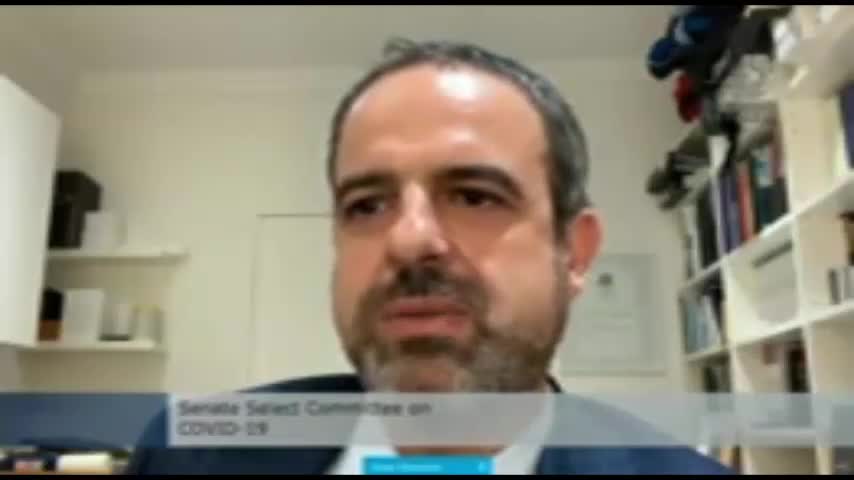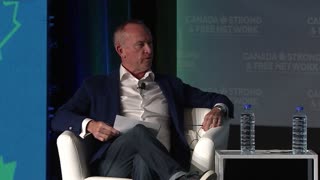Premium Only Content

GPs & AMA - Australian Parliament - 27 April 2021 COVID-19 Hearing
Questions to and hearing from Royal College of General Practitioners & AMA regarding vaccine hesitancy, indemnity, no-fault vaccine injury scheme, Pfizer versus AstraZeneca, GP Billing, adverse effects, droplet or aerosol, TTS
CHAIR ( Senator Gallagher ): I declare open this hearing of the Senate Select Committee on COVID-19. Today’s public hearing will focus on vaccinations but may cover other matters under the terms of reference.
I now welcome Associate Professor Charlotte Hespe from the Royal College of General Practitioners.
Associate Professor Hespe, do you have a brief opening statement that you would like to make to the committee?
Prof. Hespe : Thank you very much. I’d like to begin by acknowledging the traditional owners of the land on which we are meeting today and pay my respects to elders past, present and emerging. I am here on behalf of the Royal Australian College of General Practitioners, representing 41,000 members working in general practice across Australia, both urban and rural. I’d like to thank the committee for the opportunity to respond to the inquiry into the Australian government’s response to COVID-19. At the time our submission was written, in June 2020, we noted that Australia had performed incredibly well in comparison to other countries around the world, managing to successfully limit the spread of COVID-19. This remains true, with next to zero community spread currently in Australia. With COVID-19 cases continuing to surge around the world, Australia is in an enviable position. Much of our success can be attributed to the health system—including GPs, who responded decisively and proactively at the onset of the pandemic. General practices continue to find creative new ways of working so that we can continue to deliver safe and essential care to our communities.
We believe that there are lessons to be learned from this pandemic. The role of GPs as frontline health providers must be formally recognised as part of the pandemic preparation, response and recovery. As the cornerstone of Australia’s health system, GPs and their teams can and should be central to national, state, territory and regional emergency planning and responses. The RACGP hopes that GPs’ experiences in dealing with COVID-19 will highlight the longstanding need for increased funding to support general practice to enable ongoing patient access to high-quality and affordable care.
COVID-19 has given rise to innovative ways of delivering care, and we applaud the government for assisting us in delivering via telehealth. We strongly encourage that telehealth become a permanent part of the Medicare system, and we welcome the announcement that it is at least being extended to Christmas. But we are disappointed that, at this point in time, telephone calls have been limited just to basic consultations, without the flexibility for some of our rural and remote members of the Australian population being able to access the full range of health care through the telephone.
We mentioned in our submission that the primary healthcare response is far from over for the pandemic. We’ve got the ongoing effects of the pandemic for the health of Australians, and our way of life is likely to be seen to be affected for many years to come. GPs are also front and centre of the current rollout of vaccine across Australia. This is the most important public health initiative, and it’s critical that we do get it right. Patients are turning to GPs for information about the vaccine, and GPs have shown their willingness to participate in the rollout. But more support is needed for the GPs to access greater supplies of vaccine in order to meet the demand, and the government must provide clear information to help us address the vaccine hesitancy.
Dr Khorshid : I’d like to thank the committee for the invitation to address you again. Similar to the College of GPs, the AMA would like to reflect on just how extraordinarily successful our approach to COVID in Australia has been, in our public health measures, the ability of all our levels of government to work together to achieve what needs to be done and the ability of our health sector to respond to the changing nature of the pandemic, including most recently our GPs stepping up to be part of the vaccination program.
We know that the vaccine rollout has been quite frustrating for many Australians, and we share that frustration, though we have reflected on the fact that most of the delays have been due to international supply constraints on the vaccines, until we had our own local supply—and of course made worse by the blow to public confidence that came from the ATAGI decision around the AstraZeneca vaccine’s appropriateness for Australians under the age of 50. That has created a problem in public confidence, and it’s something that we’ve been trying to bolster, I guess, throughout the pandemic—really reinforcing Australians’ confidence with the decisions of our various governments and, in particular, the vaccine program, which is, as was stated before, an absolutely critical aspect of our response and our only real visible pathway out of this pandemic.
As I mentioned before, the confidence of the public is important, but we also need the confidence of general practitioners in terms of their ability to participate in the program. There has been a level of concern about the indemnity risk that GPs are taking on by participating. In other countries, the practitioners that are participating are formally indemnified by the government, and that’s not the case here in Australia. We’ve been very clear that GPs are covered in their individual interactions with patients, and there is no risk to patients here, but there is a risk to our indemnity industry, to the premiums that our GPs are paying for their insurance, and it’s something that we believe government must step in and address. We’ve had a number of discussions—as have other bodies such as RACGP and the medical indemnity providers themselves—with government to try and resolve this issue. That discussion is ongoing, but it’s one that we really look forward to resolving in order to make sure that our GPs are fully confident to continue to participate in the program.
I won’t cover telehealth, as it’s been covered by the college just now. But we would certainly echo the comments made previously. The last thing I’d like to quickly cover is hotel quarantine. That’s been very topical of late. The AMA remains of the view that hotel quarantine has been an extremely successful program overall. But it has also failed us on a number of occasions, resulting in outbreaks and subsequent lockdowns and other public health measures that have significantly affected Australians’ quality of life. Of course, the worst outbreak in Victoria resulted in the loss of over 900 lives. This is actually very serious stuff, and we don’t believe that absolutely everything has been done in every state to ensure that hotel quarantine is as safe as it could be. We would certainly look forward to our state governments working together, to learn from each other, to make sure that they’re all operating at the same level of safety. We also believe that the national cabinet should be looking at other alternatives. Hotels were a short-term measure. They were brought in really quickly and very successfully, but they have had a number of breaches. We would expect those to continue. We are likely to need quarantine for many, many months, if not years, into the future, just looking at how this pandemic is rolling out around the world. We only need to look at India to see that it’s very unlikely that our borders will be freely open any time soon, regardless of how the vaccine rollout goes. We need to make sure that we have fit-for-purpose quarantine facilities available for the future. I’ll leave it there. We’re very happy to take questions.
CHAIR: Thank you very much. Dr Khorshid, there are a couple of things that you said in your opening statement that I wouldn’t mind quickly following up. Around the indemnity risk, you said that GPs need to be fully confident to continue in the program and that the federal government must step in and address this issue. Is there a particular solution that you have put to the government?
Dr Khorshid : The AMA has put a number of potential solutions to government, starting with our longstanding view that a no-fault vaccine injury scheme is something that Australia could and perhaps should consider. That was our view prior to this pandemic, and it would certainly have been of assistance during the pandemic. Specific measures that can be brought in quickly include a mechanism for any person who felt they had been injured by a vaccine to access the indemnity that the Commonwealth already supply to the vaccine manufacturers, because, at the end of the day, the likely party that would be sued by an individual who’d been injured by a vaccine would normally be the vaccine manufacturer. But the pathway to getting there and our legal system mean that GPs may be unwittingly caught up in that. We’d like to see GPs out of any discussion around vaccine injury, unless they have directly contributed to it themselves, in which case, of course, they should be involved.
The backup mechanism, which we think has a lot of merits but doesn’t fully address the situation, would be a guarantee to our indemnity industry that the government would pick up the cost of any claims that were the result of the vaccine program that came to our medical indemnity organisations. This would be similar to some existing schemes, but it would mean that the government would provide that assurance to the insurers themselves. If there is minimal risk, which is a view that some in government hold, then this should cost government nothing; but, if there is significant risk, then obviously there could be significant cost. Of course, this would assist our indemnity providers in accessing reinsurance on a global reinsurance market, because many other countries do have no-fault schemes or other schemes that protect doctors from claims as a result of these vaccine programs. It may be difficult for our insurers to access reinsurance on those global markets if we are a higher risk environment than other countries.
CHAIR: On hotel quarantine, you said that you think national cabinet should look at other alternatives. Does the AMA have a view on what those might look like?
Dr Khorshid : We would really stick to the first principles, being that we believe Australia needs better access, particularly during this pandemic, to purpose-designed quarantine facilities. There have been many commentators out there suggesting what facilities might be good. The one closest to what we think would be appropriate would be the Howard Springs facility in the Northern Territory, which has been used for that purpose both prior to this pandemic and during the pandemic. But at the end of the day, it is about achieving the appropriate separation to avoid contamination of other residents or the quarantine facilities and, in particular, avoiding transmission of any infectious disease to the staff that are providing care in those facilities, within reasonable distance of appropriate healthcare facilities because people do get quite sick, particularly with COVID, quite quickly. If you have COVID-positive people, they need to have access without a long airborne transfer to a hospital with ICU facilities. It has been suggested, and we would agree, that the outskirts of major cities may be places where you could build an appropriate facility that would have access to healthcare but not be within a CBD environment or a high-rise building type of environment, where it is much more difficult to ensure the separation between people. There is also the benefit in an open-air environment, not just for the air flows but also the amenity and quality of life provided to Australians that are entering those facilities so they don’t feel like they are in jail or in detention just by wanting to return home to Australia.
CHAIR: I will go to the college now. Members of parliament have been getting quite a bit of feedback from general practitioners about how the program is actually practically rolling out for them and their patients. Do you have any kind of immediate improvements that could be made to make life for GPs and their patients a bit easier with the vaccine rollout? In a practical sense, what would immediately help to improve the arrangements that are in place now?
Prof. Hespe : Thank you for asking that question. The biggest thing for most of the GPs around the country is actually having increased vaccine supply. There does seem to be a rather bizarre way that the vaccine numbers have been allocated around the country. Increased numbers have gone sometimes to practices that don’t have large numbers of their own patients but which are seen as being a vaccine hub, whereas practices where they do actually have large numbers of patients who are waiting—patiently, can I say—to have their vaccination done via their own trusted general practice are being [inaudible]. For instance, in my own practice, where we have well over 8,000 patients waiting for a vaccine, we get 50 doses a week, whereas a GP down the road from me has been complaining because he gets 400 doses a week. He is a solo GP with a far more limited number of patients of his own. It is because he is designated as a respiratory clinic to do the rollout of the vaccine. One of the big advantages, we say, of having vaccines done with GPs is that the majority of patients would like to actually do it in a place that they know and trust, and where someone has their medical history, particularly the vulnerable patients. I think a lot of people who don’t have medical history are quite comfortable going elsewhere. But while we have still got a lot of the older patients and people with medical conditions, I would just beg, really, that the number of vaccines to those standard practices increase so they can just roll it out smoothly. We do this for the flu every year and it is smooth, it is efficient and it just happens. The big bugbear has been supply.
CHAIR: Is there anything else outside of supply? Is the booking system working and all that kind of stuff?
Prof. Hespe : Look, it has been very difficult. Every day there is some different information about the vaccine. What would be really nice is having consistent messaging from across the states as well as the federal government about what vaccines are going where, because there has been this whole thing about Pfizer versus AstraZeneca, which is completely understandable but very unhelpful. We do know that AstraZeneca is safe and that it has a really good outcome for the vast majority of people that it is indicated for—for us, everybody who is 50 and over. We just need to be able to get on with doing that and have some clear communication lines about Pfizer versus AstraZeneca for people as they plan going forwards. But that is difficult.
CHAIR: Is it clear to general practitioners who gets what under the arrangements that were agreed to at national cabinet last Friday? The information is changing, so is that information getting out in good time for doctors?
Prof. Hespe : Yes, I think that was incredibly helpful. Up until then there was quite a lot of confusion. What was really helpful was saying, ‘Okay, those under the age of 50 will be able to access Pfizer.’ At least we can sort of have that in mind and just roll out the AstraZeneca for the 50s and over as quickly as we can so that then we have got the time to be able to roll out Pfizer for everybody under 50.
CHAIR: Just finally, there is some information coming forward that there is an increase in vaccine hesitancy since the ATAGI decision was announced? What do you think could be done there to deal with that and to put downward pressure on the increasing rate of vaccine hesitancy?
Dr Khorshid : I think the key is the way that we are delivering messages out to the community, particularly when it comes to reports of side effects from the vaccines. That is something that we need to take, I guess, the media on a journey with us, because sensational reporting of a single potential side effect in a vaccination program that has already gone out to close to two million people is really not helpful and it harms confidence way out of proportion to the actual risk to any individual. It is really difficult to communicate a clear understanding of what a one-in-100,000, or one-in-200,000 risk actually looks like. I think a little more consistency and effort on that part would be good, as would making sure that when announcements are made there is an understanding of how that would be received by the Australian community. It is important to be transparent, but we need to make sure we are not being sensationalist in being transparent or driving up the temperature when it normally isn’t. Most Australians wouldn’t have the faintest idea of the brand of vaccine they are given for any other condition. They wouldn’t know what its results are, its effectiveness, it’s side effects. They trust that the doctor and the regulators do the right thing. I know it is a little bit unlikely in this particular case, but we need to get to the point where Australians accept that the TGA and ATAGI have looked at absolutely everything they can and that if they are recommending that there is a clear benefit to vaccination then that is the message and it is as simple as that.
CHAIR: Did you have anything you would like to add to that?
Prof. Hespe : Yes. I agree with everything Dr Khorshid has said. The biggest thing is visual aids help the understanding that this is actually a very small risk; we have got large numbers around the world that have demonstrated what a good vaccine it is. It is also very difficult because we have no COVID in the country, so it is hard for people to understand what that risk means to them when we just otherwise really seem to have a normal life. We know medically that what we are trying to do is prevent the awfulness that is happening overseas. I think some more conversation around ‘this is why we are doing it as a community‘, so it isn’t individual but is actually because we do want to go back and because we do have to prevent that sort of infection, whereas it is a no-brainer when you are actually amongst the pandemic infection numbers.
Dr Khorshid : What is really important here too is the role of general practitioners in communicating that risk to individual patients. We have had a lot of reports of GPs saying that it is taking longer to have that conversation around consent with a patient, but at the end of the day almost everybody is saying yes. I have certainly found in my own practice, probably because I am president of the AMA, as an orthopaedic surgeon I am being asked in every consult what I think of the vaccine—should I have it now; should I have it before my surgery; what do you think of this clotting business et cetera? Once I have explained it, patients tend to look at it with a much better understanding. So I think that deliberate pivot from the over-50s to general practice rather than to mass vaccination clinics is a good decision and it should remain at the core of the program.
Prof. Hespe : Can I quickly add to that. It is taking a lot longer to have those conversations. It isn’t a mass vaccine program from a GP perspective; it is an individualised, tailored conversation. We need to recognise that in the billing, and we have been asking that that is recognised suitably for GPs to bill appropriately for the amount of time they should and need to spend with members of the public to encourage them to have the appropriate vaccination.
CHAIR: Can you explain to the committee what the arrangements are now for delivery of a COVID vaccination, and what you are allowed to bill for?
Prof. Hespe : The current billing is to the level of a level A consultation, which is less than five minutes. Realistically, if you think about how long you want somebody to have a conversation with you about how you perceive the risks, what they mean, how you put that in with your flu vaccine, when the next one is and what the actual risks are, it doesn’t take five minutes. Then you’ve still got to do a vaccination, which takes up a whole lot more time on top of that.
CHAIR: Are you suggesting you’d want something like a level B consultation?
Prof. Hespe : I’m suggesting that we certainly need a level B consultation for discussing the role of the vaccine with the individual. There will be some people who have already made a decision, so there should be a choice of whether it is level A or level B—so tailor it, and trust GPs to bill the right amount for each of their patients.
CHAIR: Thank you.
Senator SIEWERT: In terms of the Australian Immunisation Register, are both of you finding that it’s effective? Are there any issues with it?
Prof. Hespe : It’s been fantastic—having it as a mandatory part of participating in the scheme and also being mandatory to upload on a daily basis. It means there’s an assurance that there is a record for everybody of what they’ve had and when they’ve had it, so we can make sure there’s safety around flu vaccinations and the second dose of each of the vaccines. All of my patients who’ve had it are delighted by being able to see all of their vaccines. From my perspective, as a GP, I think we’ve needed this. For instance, for vaccines that get administered in a pharmacy, often the patient doesn’t know what they’re given. For flu vaccines, that’s been really difficult. Now, pharmacists as well as doctors have to upload it. It means there is now this across-the-board community registration of what vaccine you’ve had and when, which is so much better for safety, quality and the proper care of our community.
Senator SIEWERT: So it’s operating as intended?
Prof. Hespe : It’s operating, and for practices that have all their systems set up—which they should have if they’re part of the vaccine rollout—it’s really smooth and easy. For my practice, and a lot of practices around New South Wales, the patients are able to tell us about any adverse reactions after the vaccine as well. I get a daily report about what adverse reactions patients are reporting about all of their vaccines, which is a fantastic feedback tool for knowing and understanding what’s actually happening as we are rolling out the vaccine.
Senator SIEWERT: I’m going to run out of time soon, so sorry if I am jumping around. Dr Khorshid, you touched on hotel quarantining and what’s been happening here in WA. Can I ask a broader question about airborne transmission? We still have this difference of opinion going on about how significant airborne transmission is, but it seems to me that, in a number of the occasions where we’ve had outbreaks here in Australia, it’s the issues around ventilation and airborne transmission that we have problems with. What’s your opinion on that? How do we deal with this issue, and how do we get past this difference of opinion?
Dr Khorshid : It has been extremely frustrating to watch this. It’s almost been a pitched battle between people on either side of the argument. Actually, as is often the case, they’re both right. There’s no doubt that, if you look at the epidemiology of the COVID illness, it is a droplet spread virus in most circumstances. If it were mostly spread by airborne spread, it would be like measles: everyone who walks into a room would get it, it would have gone all over the world and we’d all have it by now. It’s not like that, which is a good thing. However, there’s no black and white here, and there’s no doubt that airborne transmission has been implicated in a whole series of outbreaks all over the world, through breaches of quarantine and breaches of PPE in hospitals and healthcare settings. There is a good, scientific explanation behind it now.
In our own experience here in Australia, the reality of the number of healthcare workers who were infected in Victoria was a good sign that the established PPE protocols that were put out by the Infection Control Expert Group and implemented by our state governments were not adequate. Thousands of healthcare workers were infected, and that would have been avoidable if a more careful approach had been taken. We brought this issue up a lot last year during the Victorian outbreak. The government announced that the National COVID-19 Clinical Evidence Taskforce would be asked to look into the evidence and come up with new guidelines, mainly around PPE, but to really answer this question around airborne spread as well. Unfortunately, that work is not yet complete. It is almost complete. Some new guidelines are coming very shortly, but they’ve still got their way through ICEG itself and then through the AHPPC before they become a reality.
And whilst you might say, ‘Well, we don’t have outbreaks, so why are we worried about healthcare worker protection?’, the reality is that we’ve had an outbreak in Queensland as a result of a doctor and a nurse not being appropriately protected in their workplaces in Queensland. And of course the philosophy around droplet-only spread seems to be built into at least some of our hotel quarantine facilities. So, it’s about accepting that philosophy that yes, in certain circumstances, and not only limited circumstances, it is airborne spread and therefore, in order to protect people and in order to have a system that works 99.999 per cent of the time, you need to put in appropriate levels of protection.
So, we’re really looking forward to these kinds of PPE wars being over and to new guidelines coming out soon. That will directly address the workplace safety issues and the fact that workers deserve to be protected even from a one per cent risk of COVID. And I think if that philosophy flows out into our hotel quarantine as well it will make it much safer.
Senator SIEWERT: I want to go to the issue of over-50s vaccination, particularly focusing on 1b, but over-50s who, for whatever reason, can’t have AstraZeneca. I’ve had a number of people contact me saying that they’ve got an underlying medical condition. They actually qualify for 1b but because of their underlying medical conditions—for example, a history of clotting—they really shouldn’t have AstraZeneca. Have either of you come across this issue, particularly you, Professor Hespe? And what is the official position, that you are aware of? Can they have access to Pfizer if they’re over 50 but they have these underlying conditions that increase the risk with AstraZeneca?
Prof. Hespe : Perhaps I could start by shooting down the hypothesis that those conditions are associated with risks with AstraZeneca, because they’re not. There’s actually now a really good body of evidence showing that there is no underlying condition that predisposes you to the side effect that everybody is worried about, which we are calling TTS. So, even if you’ve had clotting disorders or have a family history of clotting disorders, that is not an associated predisposition that means that you are at more risk from the AstraZeneca vaccine. So, my argument is that you don’t actually have a reason to not have AstraZeneca. That’s where the media that Dr Khorshid has been talking about needs to play a role in trying to get people to understand that the evidence is not pointing a finger at these conditions as making it more likely. It’s just that people are generally fearful, because they think that if they’ve had a clot then surely they are more at risk of a disorder that has clotting linked to it.
So, that’s sort of where I go, and those are the conversations that I’m certainly trying to get the GPs to have with patients. But it’s very hard to shift some of the fixed ideas that have been planted very firmly. At the beginning, when we didn’t know what was associated with TTS, it was a fairly appropriate thing to say, ‘Well, if you’ve had a clotting disorder, let’s stay away.’ So, we sort of created it for ourselves, a bit, as we were finding out what the evidence was.
Senator SIEWERT: How’s that information being made available? As I said, I’ve been contacted by people raising this issue. Is there a process of going back to people who have had their appointments cancelled and letting them know this information?
Prof. Hespe : That’s where we’re hoping they can have those conversations with a GP who know the patient, rather than necessarily being in a clinic where people might not know them or might not feel comfortable having that level of conversation. But I think we do need to take a responsibility for sharing that more widely so that those who are having those vaccine hesitancy conversations do feel comfortable sharing that. I know there are still some doctors who feel uncomfortable because they have fears themselves about what the risk might be—which goes to the conversation about being afraid that they’re then going to be sued if they’re the person who says, ‘Go ahead,’ and what that means. It becomes a bit of a complex catch 22 about what advice someone’s willing to give when they’re afraid they might be sued, when in fact the evidence says that that isn’t the risk and you can reassure them that that’s not the case—that the risk is the same for everybody.
CHAIR: Senator Lambie.
Senator LAMBIE: ATAGI says that someone under the age of 50 could choose to get AstraZeneca if the benefit of being protected from COVID-19 clearly outweighed the risk in that person’s circumstances. The Prime Minister said the choice of whether to get the AstraZeneca vaccine is between individual Australians and their doctor. Have doctors been given clear guidelines about how to weigh up whether the benefits outweigh the risks for their patients? I know that was a problem when ATAGI’s advice changed.
Dr Khorshid : The AstraZeneca vaccine is still a very safe vaccine, even for people under the age of 50, if you’re in a different circumstance. And that all comes down to risk and benefit. The risk is understood: it’s very rare. But, in Australia right now, your chance of catching COVID and ending up in hospital and dying if you’re under the age of 50 is minuscule, because we don’t have COVID, plus you are in a low risk-group. What ATAGI has done is balance the risk against the benefit and come up with these recommendations.
If you are travelling to the UK or to India, then you’re going to be in a very different risk environment. If I were under the age of 50 and had access to AZ, I would grab it in a flash if I were going overseas. It’s that kind of scenario that we’re thinking of. I don’t think there are too many medical or other individual aspects of people that would alter their risk and alter that recommendation from ATAGI. GPs are not going to be vaccinating huge numbers of young Australians who want AZ, unless I’m mistaken, Perhaps Professor Hespe can fill that in.
Prof. Hespe : I agree. It think the difficulty around the age of 50 is that you’re the cut-off mark. It’s like anything: you have to have a cut-off, and 50 was deemed to be where that balance lies, but, if you look at the risk stratification between the ages of 40 and 60, it’s not that at 50 you radically change from 49. That’s why it is difficult for some people to say, ‘Why am I doing AstraZeneca versus Pfizer?’ And that’s why it’s so important to have those conversations.
From my perspective, if people want to wait to try and access Pfizer when it comes into the country much later down the track, go for it, but you’re going to be lowest on the list of priorities, because all of those who are under 50 will be prioritised for Pfizer when it does come in. Again, it is exactly that conversation about trying to decide what is the risk for you, how many other predisposing conditions do you have, are you going to be more likely to be at risk of COVID if COVID does come into the country or are you needing to travel? It’s those sorts of conversations rather than individually—because, at 50, there is no other reason to be having the difficulty of making the conversation, but I think everybody has a right to decide that they would rather wait 12 months to access another vaccine if they wanted to, whereas, realistically, they’re probably better off getting the AstraZeneca now.
Senator LAMBIE: My mates and I have all just turned 50 in the last two months, and we’re not lining up to get AstraZeneca—just so you know. What I want to know is, have the doctors been given clear guidelines about what they should be looking at? Is there official advice that they can rely on to make the call that an AstraZeneca vaccine is worth the risk? What guidelines are there?
Dr Khorshid : The AstraZeneca vaccine is an extremely safe and effective vaccine—full stop. When you look at other medical treatments, like when you go and get a blood pressure pill or go on the oral contraceptive pill or go and have an operation, there are risks associated with anything you do in life and certainly with anything we do as doctors with patients. What we’re constantly doing—what our regulators do, what our individual doctors do and what patients do—is weigh up those risks and benefits before deciding on their treatment.
We’ve got the huge benefit in Australia of watching what is happening in other countries that are way ahead of us in the vaccine rollouts. We’re not just making this stuff up; it’s based on millions and millions of doses of these vaccines that have been administered around the world and that leads to confidence in the vaccines. There’s a really simple message now, and that’s probably one good thing that has come out of the national cabinet decisions in recent weeks: it’s not a 1A, 1B, 2A, 2B or phase 3 thing anymore. It’s now: under 50s get one vaccine and over 50s get another vaccine. Both of them are really good vaccines. Both of them will be available to Australians sometime this year. There really is not much else to say. Those who are not in the high risk groups are going to have to be a little bit patient, unfortunately, due to the time it takes to access the Pfizer from overseas. But we’re in an extraordinary position to get access to these two vaccines so early in a disease’s history. This has never happened before in the world, and I think we just need to remember that.
Senator LAMBIE: Do you think there’s a problem with people’s confidence in AstraZeneca? They’re obviously losing confidence by the day. That’s my first thing. My second thing is that it doesn’t have a compensation scheme to back it up even though it’s so credible. Do you think that’s the problem of why people are now getting extremely hesitant about lining up to get those shots?
Dr Khorshid : I think the reason people are hesitant is partly because of the nature of the media coverage of the rare but serious side effects that have been determined. We see serious side effects in medical treatments all the time, but they don’t appear on the front page of the paper. It is scary for people. It’s our job, as the medical profession, and it’s the job of our government, to help people understand why the recommendations are being made so they can have confidence in them. You only need to look overseas to see the alternative of a vaccination program.
A no-fault scheme would be a good idea. The number of Australians who are going to be harmed by these COVID vaccines is tiny. It is really, really, really small. We harm more people on our roads on a daily basis than would be harmed by these vaccines. The risk behind a no-fault scheme is extremely small. I don’t believe the government are concerned about the level of risk and the cost of the program, so you’d have to ask the government as to why they haven’t done it. At the end of the day, Australians will have access to suing the manufacturers. If they were injured by a vaccine, they could sue the manufacturers, and the government are actually covering those manufacturers. The government will be on the book if people were injured by the vaccines. What we want to make sure is that doctors who administer the vaccine in good faith, appropriately, with appropriate consent, don’t get caught up in that legal process.
Senator LAMBIE: I’ve seen out there in those rural and regional areas that they’ve been doing it tough. Whether or not you both support it, I’m calling for it and I’ll continue to call for it when it comes to counsellors being put on the Medicare Benefits Schedule, because I cannot get those kids in to see the psychologists and the psychiatrists for weeks. They will not go and see those counsellors because they’re not getting a rebate, and counsellors cannot be expected to work for free. Do you have an opinion on that?
Dr Khorshid : It’s perhaps a little off topic, but we would certainly support better access to mental health services for rural and regional children and adults around the country at a price that’s affordable to them, but we probably don’t have time to discuss the detail or how you’d arrange that, but certainly we’d support better access to services.
CHAIR: Okay, and that’s a thumbs up from Professor Hespe as well, endorsing that. Thank you very much, Dr Khorshid, for taking that out of left field. Can I thank you very much for appearing before the committee today. We do genuinely appreciate your engagement with us as we continue to focus on COVID-19 and the rollout of various programs, so, on behalf of the committee, thank you very much.
27 April 2021 COVID-19 Hearing
Full Video:
https://parlview.aph.gov.au/mediaPlayer.php?videoID=540409&operation_mode=parlview
-
 10:40
10:40
Australian Parliament Senate Committee Media Briefings
1 year agoSenator Hanson grills Pfizer Officials
218 -
![🔴[LIVE] Breaking CPI Inflation Report (Stock Market Pump) || The MK Show](https://1a-1791.com/video/fww1/f2/s8/1/9/Y/T/A/9YTAy.0kob.1-small-LIVE-Breaking-CPI-Inflation.jpg) LIVE
LIVE
Matt Kohrs
8 hours ago🔴[LIVE] Breaking CPI Inflation Report (Stock Market Pump) || The MK Show
1,921 watching -
 LIVE
LIVE
Dear America
9 hours agoTrump Puts China On An Island, Brings Xi Jinping To His Knees + Tampon Tim Gets BOOED By Veterans!
2,099 watching -
 LIVE
LIVE
Wendy Bell Radio
4 hours agoTrump Wins Again
3,814 watching -
 1:26:51
1:26:51
JULIE GREEN MINISTRIES
2 hours agoLIVE WITH JULIE
54.8K90 -

Game On!
16 hours ago $2.34 earnedThe Masters 2025 is HERE!
10K -
 LIVE
LIVE
Canada Strong and Free Network
43 minutes agoCanada Strong and Free Network
146 watching -
 8:33
8:33
SKAP ATTACK
16 hours ago $1.31 earnedWhat Went Wrong With the Nuggets
11.7K4 -
 23:51
23:51
JasminLaine
15 hours agoCBC STUNNED Into Silence as Carney PANICS—Defends Bill C-69 and His Foreign Profits
12.6K19 -
 17:25
17:25
World2Briggs
12 hours ago $1.71 earnedThe Dark Reality Of Human Trafficking In The United States
10.6K11